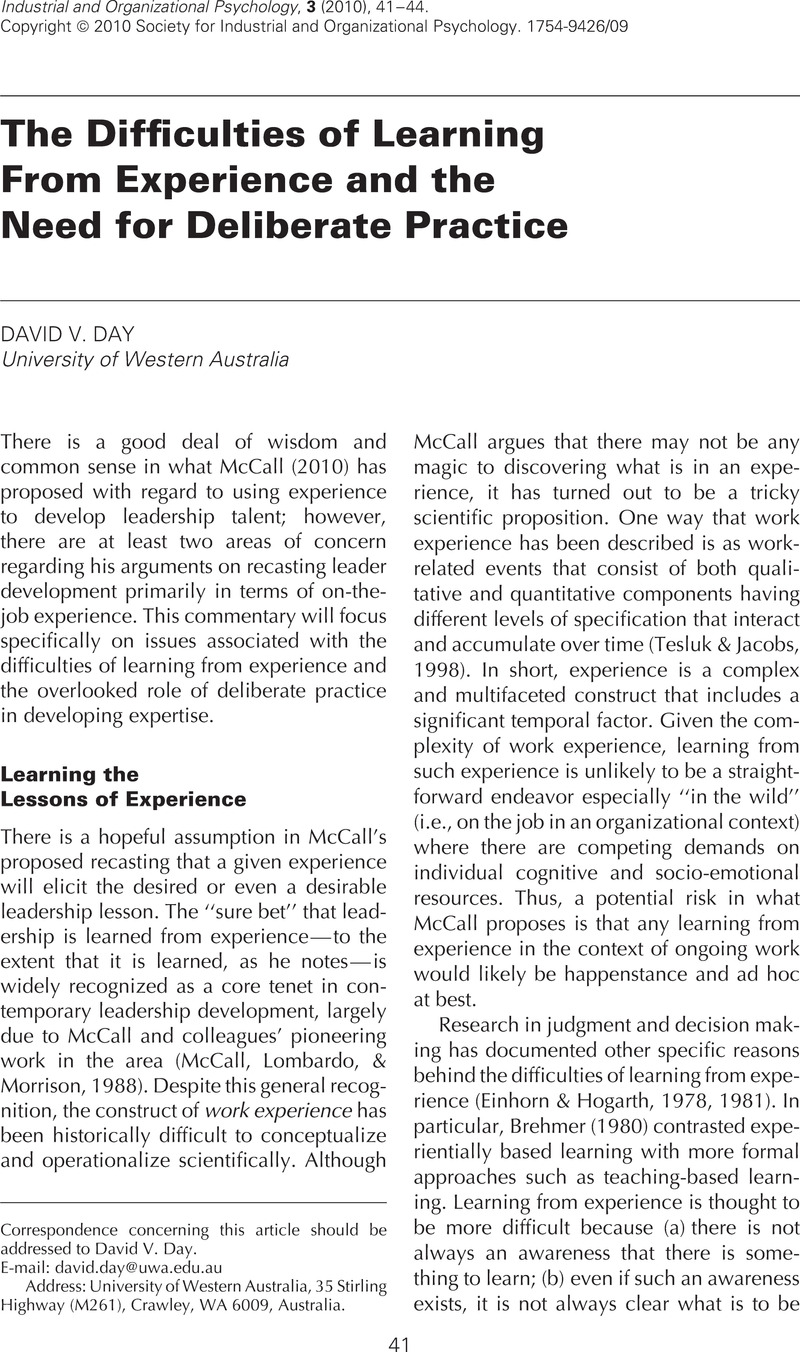Crossref Citations
This article has been cited by the following publications. This list is generated based on data provided by Crossref.
McCall, Morgan W.
2010.
Peeling the Onion: Getting Inside Experience-Based Leadership Development.
Industrial and Organizational Psychology,
Vol. 3,
Issue. 1,
p.
61.
Day, David V.
and
Sin, Hock-Peng
2011.
Longitudinal tests of an integrative model of leader development: Charting and understanding developmental trajectories.
The Leadership Quarterly,
Vol. 22,
Issue. 3,
p.
545.
Petriglieri, Gianpiero
2011.
Identity Workspaces for Leadership Development.
SSRN Electronic Journal,
Petriglieri, Gianpiero
Wood, Jack Denfeld
and
Petriglieri, Jennifer Louise
2011.
Up Close and Personal: Building Foundations for Leaders' Development Through the Personalization of Management Learning.
Academy of Management Learning & Education,
Vol. 10,
Issue. 3,
p.
430.
Garavan, Thomas N.
Garavan, Thomas N.
Carbery, Ronan
and
Rock, Andrew
2012.
Mapping talent development: definition, scope and architecture.
European Journal of Training and Development,
Vol. 36,
Issue. 1,
p.
5.
Meyers, M. Christina
van Woerkom, Marianne
and
Dries, Nicky
2013.
Talent — Innate or acquired? Theoretical considerations and their implications for talent management.
Human Resource Management Review,
Vol. 23,
Issue. 4,
p.
305.
Sashkin, Marshall
2014.
Handbook of Human Resource Development.
p.
62.
Dong, Yuntao
Seo, Myeong-Gu
and
Bartol, Kathryn M.
2014.
No Pain, No Gain: An Affect-Based Model of Developmental Job Experience and the Buffering Effects of Emotional Intelligence.
Academy of Management Journal,
Vol. 57,
Issue. 4,
p.
1056.
Meyers, Maria Christina
and
van Woerkom, Marianne
2014.
The influence of underlying philosophies on talent management: Theory, implications for practice, and research agenda.
Journal of World Business,
Vol. 49,
Issue. 2,
p.
192.
Day, David V.
Fleenor, John W.
Atwater, Leanne E.
Sturm, Rachel E.
and
McKee, Rob A.
2014.
Advances in leader and leadership development: A review of 25years of research and theory.
The Leadership Quarterly,
Vol. 25,
Issue. 1,
p.
63.
Hartman, Nathan S
Allen, Scott J
and
Miguel, Rosanna F
2015.
An exploration of teaching methods used to develop leaders.
Leadership & Organization Development Journal,
Vol. 36,
Issue. 5,
p.
454.
Sikes, Deborah
Jestes, Emily
LeClair-Smith, Colleen
and
Yates, Rowena R.
2015.
Using a 360° Feedback Evaluation to Enhance Interprofessional Collaboration.
Nurse Leader,
Vol. 13,
Issue. 4,
p.
64.
Nunes, Bernardo Pereira
Nurmikko-Fuller, Terhi
Lopes, Giseli Rabello
Siqueira, Sean W. M.
De Campos, Gilda H. B.
and
Casanova, Marco A.
2016.
Treasure Explorers -- A Game as a Diagnostic Assessment Tool.
p.
217.
Kasemsap, Kijpokin
2016.
Project Management.
p.
178.
Keith, Nina
Unger, Jens M.
Rauch, Andreas
and
Frese, Michael
2016.
Informal Learning and Entrepreneurial Success: A Longitudinal Study of Deliberate Practice among Small Business Owners.
Applied Psychology,
Vol. 65,
Issue. 3,
p.
515.
Palanski, Michael E.
Lester, Gretchen Vogelgesang
Clapp-Smith, Rachel
and
Hammond, Michelle M.
2016.
The Role of Leadership in Occupational Stress.
Vol. 14,
Issue. ,
p.
115.
Allen, Scott J.
Shankman, Marcy Levy
and
Haber‐Curran, Paige
2016.
Developing Emotionally Intelligent Leadership: The Need for Deliberate Practice and Collaboration Across Disciplines.
New Directions for Higher Education,
Vol. 2016,
Issue. 174,
p.
79.
Culbertson, Satoris S.
and
Jackson, Alexander T.
2016.
Orienting Oneself for Leadership: The Role of Goal Orientation in Leader Developmental Readiness.
New Directions for Student Leadership,
Vol. 2016,
Issue. 149,
p.
61.
Kasemsap, Kijpokin
2016.
Managerial Strategies and Practice in the Asian Business Sector.
p.
238.
Griffith, Richard L
Steelman, Lisa A.
Wildman, Jessica L.
LeNoble, Chelsea A.
and
Zhou, Zhiqing E.
2017.
Guided mindfulness: A Self-regulatory approach to experiential learning of complex skills.
Theoretical Issues in Ergonomics Science,
Vol. 18,
Issue. 2,
p.
147.



